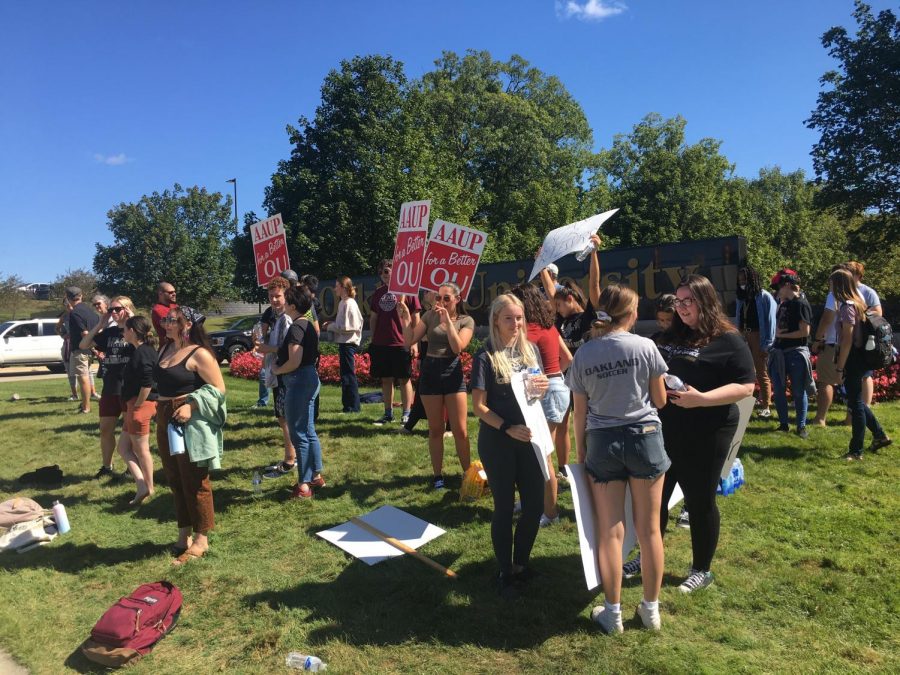My experience walking the AAUP picket lines
Picketers gathered near the Squirrel Road entrance of OU on the first day of classes on Thursday, Sept. 2.
The heavily covered contract negotiations between Oakland University administration and the OU American Association of University Professors (AAUP) resulted in two days of missed classes for students. That is, if your professors were in the AAUP and chose to participate in the labor strike, classrooms were left empty on Sept. 2 and 3.
On Sept. 2 and 3, I was supposed to have class, but instead found the classrooms devoid of professors. As of Sept. 5, an agreement has been reached between administration and the AAUP, so I may now have professors in the courses I am paying OU for.
During these days off, I decided to walk the picket lines at OU and see what the professors were really protesting for. I had many conversations with professors I had never met before, and even caught up with one I wasn’t expecting to conversate with.
I was duly informed by several professors that they were not allowed to offer official comments ‒‒ as a result of AAUP directing all official inquiries of the professors to spokespeople ‒‒ and so I started talking to students present.
The levels of knowability regarding the contract negotiations varied greatly, from some students being well informed, and some, similar to me, being cautiously distant, but still hoping that both sides bargain effectively enough to reinstate classes.
“My name is Brady Jacot, and I’m a sophomore studying theatre, music and communication. I’m here to support the faculty, specifically in the School of Music, Theatre and Dance (SMTD), because the SMTD is like a family. Everyone takes care of each other, and we must give back to them [our professors] as they have given so much to us,” Jacot said. “I just want to see everyone happy. I don’t know a ton of specifics, but I know there’s economic problems that need to be solved for everyone to go back to normal.”
Many of the students 8I spoke with had similar perspectives, in that the utterly precise details of the contract negotiations were unknown to them. Students also commented on how, conversely, protests and the ensuing labor strike would not have occurred over a small disagreement between OU’s administration and the union faculty. Rather, that this point had been reached because of a radical attempted restructuring of the relationship between faculty and their employer.
“I’m Ethan Bradley and I’m studying philosophy and political science going into my fourth and final year. Right now, I am protesting to protect the benefits and working conditions of our faculty at OU,” Bradley said. “I want to see these language demands that the university is making get shut down…things like taking away the department chair’s ability to schedule classes, drastically affecting the effectiveness of tenure, so every professor can effectively be [fired] at will.”
A primary concern communicated to me by students was they hoped these negotiations would not set a precedent for future bargaining between professors and the university’s administration. The basic wish to consume the product (classes with instructors in them) provided by the service provider (OU) was common, given that the classes missed on Sept. 2 and 3 cost money.
“I’m Alex Rye, a senior in the English department,” Rye said. “Especially after everything they’ve [the professors] done with the last year’s pandemic ‒‒ to keep us educated and classes going ‒‒ it’s ridiculous how OU slaps them in the face like this. In the end…they are just hurting the students and themselves.”












AnonymousSL • Sep 9, 2021 at 5:29 PM
Thank you for hearing the voices of the faculty. It is very much appreciated! Just to clarify a point you raised: It’s not that we weren’t “allowed” to speak with students. During negotiations, the faculty would put forward very reasonable proposals and the administration would take an exceedingly long time to return to the bargaining table. Things would move very quickly some days, and frustratingly slow other days. We, the faculty, decided that it would be best if the people speaking as our public representatives had access to the most up to the minute news from the bargaining table. This was to make sure some past proposal or rumor wouldn’t be misrepresented as the current state of things. We loved talking with the students out there with us!
Solidarity.
Ken Mitton • Sep 9, 2021 at 4:23 PM
Just for students who may have wondered what the negotiations were all about, the details have been available online since the start of bargaining at: http://oaklandaaup.org/BargainingDiary.asp
At OU the OU chapter of the American Association of University Professors (AAUP) is the State of Michigan recognized body for collectively bargaining: how my colleagues and I get compensated, how we are promoted, how we are given some of the tools we need (like a computer and office but only for your full-time professors), how minimal ratio of teachers to students is set, how the 7-year academic year calendar pattern runs, and even how faculty are disciplined if required if they fail to do their job.
In the OU-AAUP’s bargaining diary you can see what was offered by OU and what the AAUP bargained for. You will learn something about 1/3rd of your teachers (lecturers and Special Lecturers, called “SLs”) who are part-time contingent faculty and SLs are in the OU-AAUP’s Agreement with the OU Board of Trustees (BOT). The working contract is referred to as the Agreement here at the University.
Sorry, you did not learn too much from professors at whatever picket line you were at, I would have not been shy at all.
Thanks for the good story, so we all see a bit of what students experience.
Sincerely
Ken Mitton, PhD
Associate Professor of Biomedical Sciences
ERI
(a past president of the OU-AAUP)